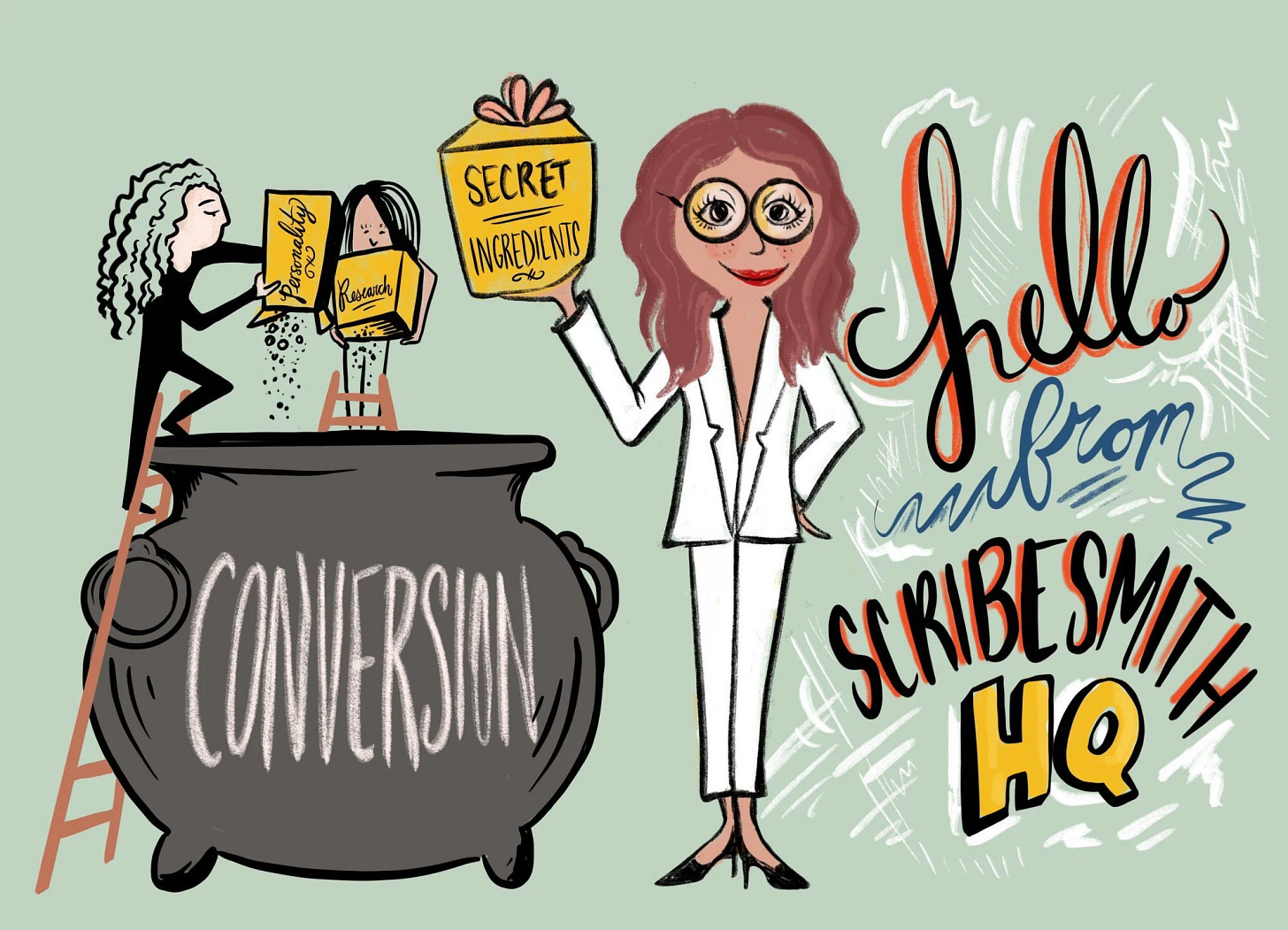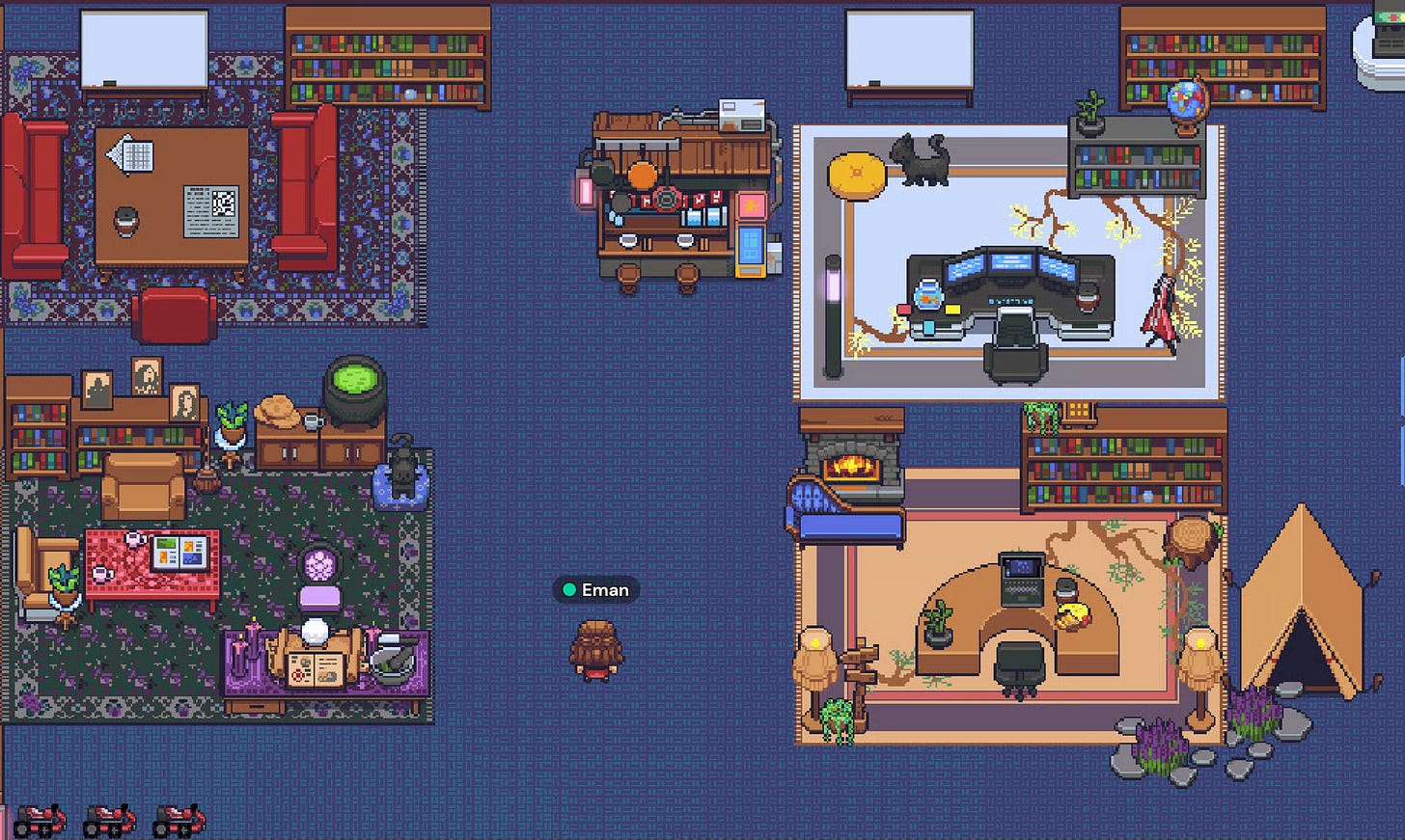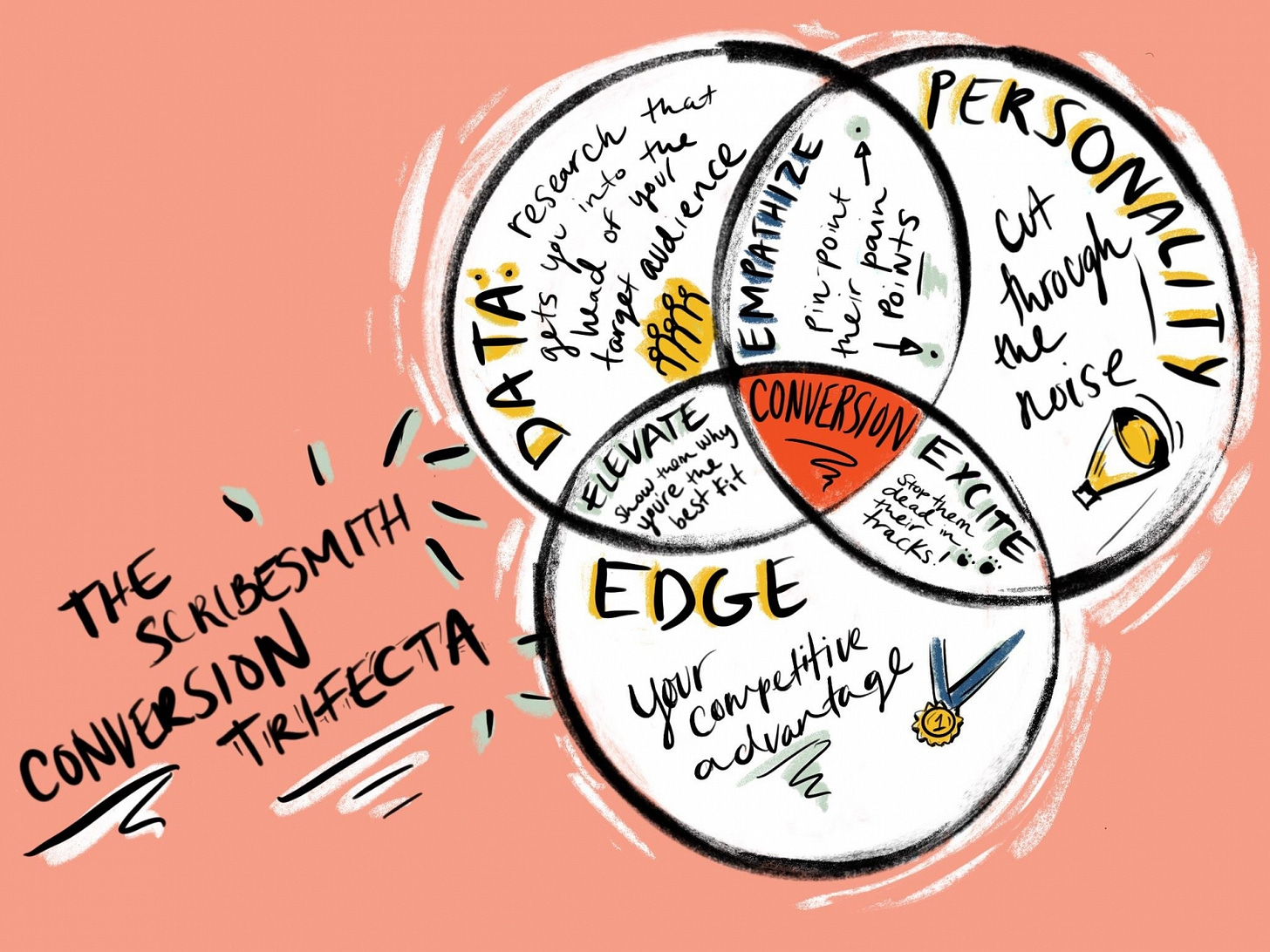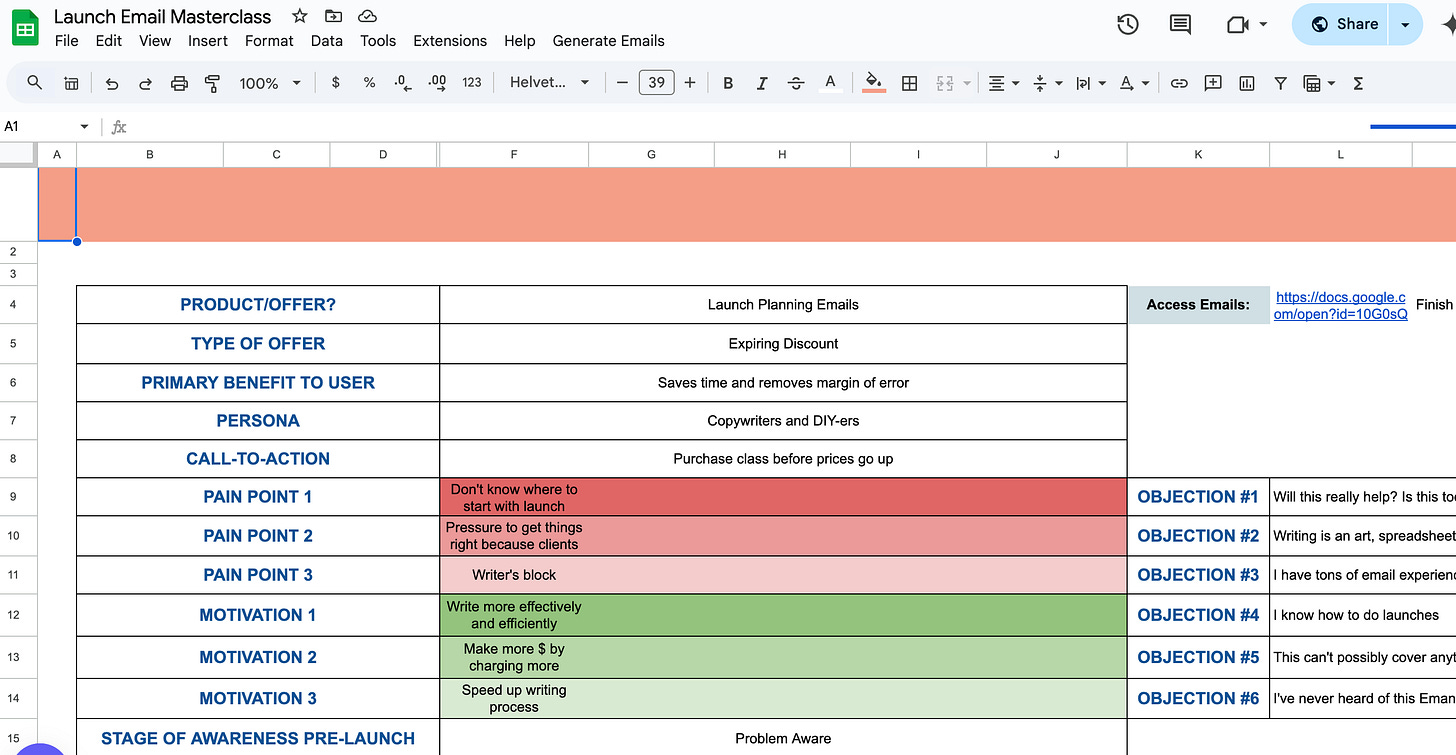The Scribesmith: A Post-Mortem
Cool things we did that I don't want to forget about
I wanted to document the collective learning that came out of The Scribesmith and Terrain. This post-mortem exists mostly because I’m worried about getting old and forgetting all the cool stuff we did at The Scribesmith, but also because if you’re building an agency, there might be stuff in here that’s helpful or that sparks an idea or two.
The Scribesmith started small: just me and a laptop in the upstairs bedroom of my parents' house. But by the time we closed up shop, we’d worked with some of the biggest names in the industry. Over the years, we took big risks, built smart systems, and created products that people loved.
Team Structure & Operations
Our biggest asset was the team. The Scribesmith was small, but every person who survived past the six-month mark was a doer. Everybody wore multiple hats: I was Copy Chief, handling client relationships and account management, and giving podcast interviews (our #1 growth channel). My very first hire, a VA who became my OBM and eventually CMO, handled internal operations—everything from pitching podcasts to our social media. We had a project coordinator who kept projects moving between writers and clients, plus a talented group of writers and designers who worked closely with me to make sure everything we put out, we were really fucking proud of.
Slack workflows and Zapier honestly deserved an honourary mention on our team page because, genuinely, we had them set up to do the job of multiple people. I cannot fathom how people worked in a pre-Zapier era sometimes.
Tech Stack:
Slack: Comms, and the our Slackbot that told coffee drinkers that tea was the superior option
Asana: Project management
ActiveCampaign: newsletter, marketing funnels, the works
Zapier: Workflow automation,
BetterProposals: Proposal software
Wix: Website (The SEO is far better than people will lead you to believe)
Custom-built HR/Employee management app: This was a personal project that we ended up using for all things HR. Loved it because it had been purpose-built for our use case and integrated with all of our systems
Google Docs & Sheets, Drive: Where all the work happened
SwipePages: Landing pages, cheaper and better than Leadpages and Unbounce
Gather.town: Virtual HQ (pictured below)
Innovation & Product Development
One of the coolest things about The Scribesmith was that we were never just writing copy. In fact, we were probably known more for the things we were tinkering with on the side. Here are a few of the things we built along the way:
Launch Planner App
Built on the idea that people were done with static PDFs as lead magnets, this app was an interactive tool for detailed launch planning. You plugged in your current list size, assets, and ideal launch date, and it worked backwards to create a launch plan. It maxed out our capacity so many times that I finally got fed up and unhooked it. Safe to say, it was one of our best lead generators. Once people opted in, the app sent them a nurture sequence, ending with a pitch to book a paid consulting call with me. That call often led to being hired to execute the launch, and those projects usually turned into long-term retainers.
Email Funnel Generator
The Launch Planner App gave you the roadmap, but the emails still needed writing. So, we built a Google Sheets template that asked key questions about the product, goals, and audience, then generated a custom email funnel from templates we’d refined over multiple client launches. This tool streamlined client projects and eventually became part of a course we sold on Terrain.
The Conversion Kits
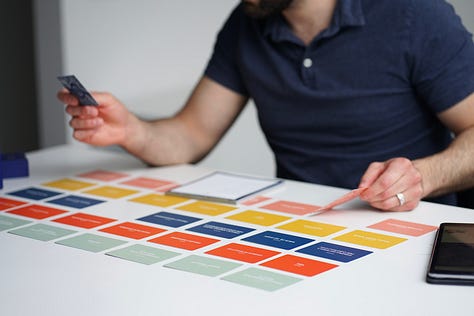
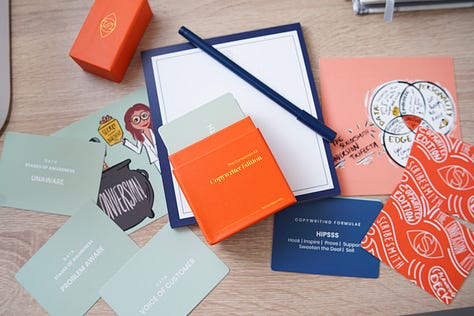

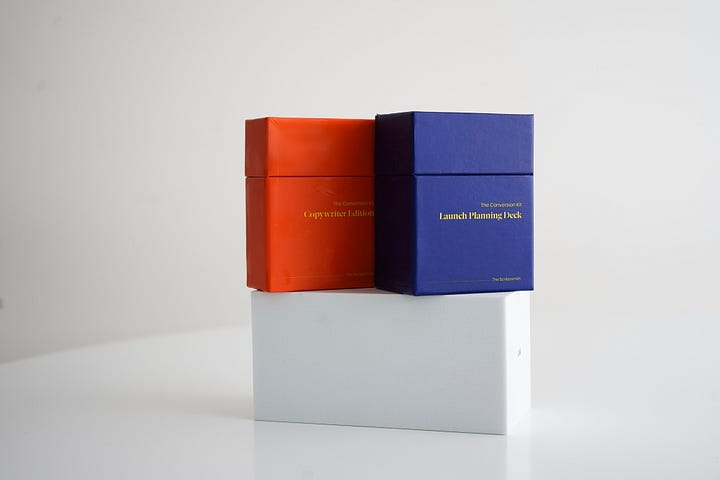



My favourite—and probably craziest—idea yet. A week before Black Friday, I decided to turn our launch planning system into method cards. Within days, we had prototypes for two decks: The Launch Planning Deck and The Copywriting Deck, based on our Scribesmith Conversion Trifecta™—Personality, Edge, and Data. We pre-sold the decks three days before Black Friday. To make things, better/worse, we'd won Product of the Day on Product Hunt, and had more orders than we knew what to do with.
This was November 2019, weeks before the pandemic hit. None of us had manufacturing experience, and suddenly we were developing cards, arranging production, and shipping to hundreds of customers worldwide.
Baptism by fire was the name of the game.
By early 2020, while the decks were still in production, we'd already started working on Terrain, which became our next big thing, but that's going to be another post.
Honourable mentions: UmHowMuch (instant quote generators for freelancers), Killer Conversion (Jaws-themed sales page writing mini-course), and the launch book I abandoned with one chapter to spare.
Memorable Projects
We worked with a lot of really cool people: Netflix, Stanford, MeetUp, Jasmine Star, the PM of the UAE, a random zoo, and an NBA star. Some of the ones that really stand out as personally satisfying were:
Stanford University's Peace Innovation Lab
During COVID-19, the lab hired us to launch a membership platform for entrepreneurs focused on peace-driven business models. We launched it, seeing a 65% conversion rate from a dead list that hadn't been emailed in 5 years. And then we stayed on to help build out the material for the programme, we researched, wrote, and developed content that the Lab and its members would actually use—this was personally very satisfying for me, because it was hitting that sweet spot between academia and entrepreneurship.
When the pandemic hit, the Lab was forced to re-evaluate its revenue streams. Working on a small task team, we formulated a bootcamp for university students who no longer had placements as a result of COVID. We created a PeaceTech Bootcamp for over 100 students from Yale, Stanford, Drexel. Over the course of 10 weeks, I worked with Nicole Elzer, then COO of the Lab, now close friend and collaborator, to help the kids design, build, and launch tech startups in 10 weeks. Every single group had a working MVP that went live at the end of those cohorts, and I couldn't have been prouder.
Project that let us play, whether that was with tech or with voice
One that stands out is the work we did for a personal styling agency. We created a forever funnel, i.e., an endless set of automated newsletters (okay, not really endless, but 52 weeks worth of newsletters) where the content varied depending on what season or time of the year it was. So, for example, it gave suggestions for holiday party outfits in December, European holiday ones in June, and so on, so that no matter when people signed up, the content felt fresh, timely, and relevant, even though it could've been written 50 weeks ago.
And a project where we did podcast show notes for a prominent FB ads educator. Her style was bold and pulled no punches, so we had complete creative freedom to really push the envelope with those emails. And people fucking loved them.
There's honestly nothing more satisfying than making internet strangers laugh.
What we learnt
Failure is data
Probably the biggest takeaway from the launch space. And that's something that has very much become embedded in my outlook to everything (Along with "eh what's the worst that can happen?". If something didn't work out as planned, there's a wealth of information from that experiment that gets embedded into the next iteration.
It has to be fun
We shipped two products a year for 7 years on top of doing high-stakes client work and building an edtech platform from the ground up. Not that it was planned or anything, inspiration struck, and we built.
None of it would’ve been possible if it wasn’t fun. Fun will, perhaps, always be the biggest thing for me personally. If I don't find something intellectually stimulating, I won't do it. To paraphrase Andrew Carnegie, your heart's gotta be in the work.
Automate the fuck outta everything
You do the thinking. Let tech do the grunt work. Even right now, I basically word-vomited this entire thing into a voice note and gave it to ChatGPT to clean up and organise. What you can't automate, however, is the thinking. Not yet, anyway.
Get really good at the tech stacks your clients use
I'm constantly shocked at how many young people struggle with technology. No, really, I was volunteering at camp for gifted kids over the summer, and I showed a couple of 21-year-olds how to drag down to fill in cells in Google Sheets, and they thought it was magic. I digress, but my point is that if you're working online and serving clients online, understanding and implementing the tech your audience uses makes you stand out in a big way. I'd argue that if you're a marketer, it's imperative to understand the tech in your field; without it, how can you make credible recommendations?
Done is better than perfect
So much so that I'm not even proofreading this. Ship fast, fix commas later bebe.
Wrapping Up
So that’s it for The Scribesmith. If you’re wondering why we closed up shop, head here. I’ll be writing a similar piece on Terrain soon, which will focus more on the research we did around online learning and what we learned about the space—so stay tuned for that.
And in case anyone was wondering if this was a puff piece to soft-launch my new and improved marketing agency?
Fuck no.


